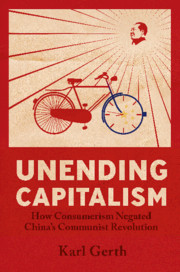
-
Select format
-
- Publisher:
- Cambridge University Press
- Publication date:
- 08 May 2020
- 14 May 2020
- ISBN:
- 9781139025225
- 9780521868464
- 9780521688468
- Dimensions:
- (228 x 152 mm)
- Weight & Pages:
- 0.68kg, 394 Pages
- Dimensions:
- (228 x 152 mm)
- Weight & Pages:
- 0.59kg, 394 Pages
You may already have access via personal or institutional login
Book description
What forces shaped the twentieth-century world? Capitalism and communism are usually seen as engaged in a fight-to-the-death during the Cold War. With the establishment of the People's Republic of China in 1949, the Chinese Communist Party aimed to end capitalism. Karl Gerth argues that despite the socialist rhetoric of class warfare and egalitarianism, Communist Party policies actually developed a variety of capitalism and expanded consumerism. This negated the goals of the Communist Revolution across the Mao era (1949–1976) down to the present. Through topics related to state attempts to manage what people began to desire - wristwatches and bicycles, films and fashion, leisure travel and Mao badges - Gerth challenges fundamental assumptions about capitalism, communism, and countries conventionally labeled as socialist. In so doing, his provocative history of China suggests how larger forces related to the desire for mass-produced consumer goods reshaped the twentieth-century world and remade people's lives.
Reviews
'A brilliantly researched and analysed account of consumerism during the Mao era. It richly documents the survival of consumer impulses and behaviour amid the puritanical ideology of the early People's Republic. This is a crucial book for understanding the social, economic and political history of the Mao era, and the tensions and tragedies resulting from the Communist Party's state capitalism.'
Julia Lovell - author of Maoism: A Global History
'This outstanding book demands that we look again at an entire period, and reassess it from top to bottom. Gerth examines the period of Mao's China and asks how we would re-read the period if we were to think of it as driven by consumerism, a project that means that if you want to engage in the scholarly discussion around consumerism in China – a huge topic – you have to read and deal with Gerth. To understand why Chinese consumers have behaved as they have, and to understand the continuities between the sharply contrasting historical periods that they have lived through, Karl Gerth's is now the scholarly standard work – without question.'
Rana Mitter - author of China's Good War: How Memory of the World War II Past is Shaping a Nationalist Future
‘Karl Gerth liberates the study of Maoist China from the Cold War obfuscations of too much academic output. He moves beyond simplistic notions of the capitalism/socialism binary that has so distorted our understanding of 20th-century China, and brings back the study of political economy to the center of debate in the bargain.'
Oscar Sanchez-Sibony - University of Hong Kong
‘Hugely stimulating and deeply researched, this book shows just how important material possessions and desires were in Mao's China. Essential reading for anyone who is trying to understand how consumption became as powerful as it is.'
Frank Trentmann - author of Empire of Things: How We Became a World of Consumers, from the Fifteenth Century to the Twenty-First
‘This volume could be useful for course discussions in economics, political science, psychology, and sociology … Highly recommended.’
M. G. Roskin Source: Choice
‘… an engaging and enlightening read. In addition to being an important contribution to our understanding of consumerism, politics, and society in Mao’s China, the book is also a valuable teaching resource, particularly for graduate-level courses on the history of capitalism and twentieth-century China.’
Janson M. Kelly Source: Pacific Affairs
‘… this book is an indispensable addition for those who are interested in the history of world consumerism and that of modern China. The rich source materials and detailed notes are invaluable sources for future research. The book’s emphasis on historical continuity and its exploration of the gap between discourses and practices are also thought-provoking.’
Yikun Zhao Source: China Information
‘a must-read for those who are interested in the Chinese economy, history and cultural studies.’
Yuanbo Qi Source: Europe-Asia Studies
'Unending Capitalism is a well-researched book about rising consumerism within a socialist society. The book provides a detailed look at how the need for speedy economic growth and industrialisation led to the CCP’s decision to prioritise capitalism over long-term socialist goals.'
Jiarui Wu Source: China Perspectives
Contents
Metrics
Altmetric attention score
Full text views
Full text views help Loading metrics...
Loading metrics...
* Views captured on Cambridge Core between #date#. This data will be updated every 24 hours.
Usage data cannot currently be displayed.
Accessibility standard: Unknown
Why this information is here
This section outlines the accessibility features of this content - including support for screen readers, full keyboard navigation and high-contrast display options. This may not be relevant for you.
Accessibility Information
Accessibility compliance for the PDF of this book is currently unknown and may be updated in the future.


